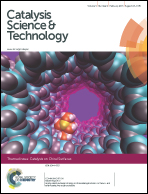Sn(ii)-catalyzed β-citronellol esterification: a Brønsted acid-free process for synthesis of fragrances at room temperature
Abstract
Simple SnCl2·2H2O was demonstrated to be able to catalyze β-citronellol esterification with acetic acid at room temperature under solvent-free conditions, achieving high conversion and ester selectivity (ca. 88% and 99%, respectively). Tin(II) chloride is a stable and water-tolerant Lewis acid that is commercially available and less corrosive than Brønsted acid catalysts. This selective process is an attractive alternative to the mineral acid-catalyzed process because it avoids product neutralization common in those reactions. The effects of main reaction parameters such as reactant stoichiometry, temperature, solvent, and catalyst concentration were assessed. Among the tin catalysts evaluated, SnCl2 was the most active and selective. Moreover, SnCl2 was as active as sulfuric and p-toluenesulfonic acid catalysts, the Brønsted acids investigated herein, with additional advantages of being a solid and less corrosive catalyst.


 Please wait while we load your content...
Please wait while we load your content...